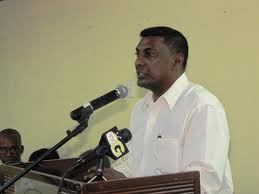“In my mind there is no violation of any criminal law or breach to any legal health protocol,” said Chief Medical Officer (CMO), Dr. Shamdeo Persaud. He was responding to allegations levelled by the Guyana Medical Council regarding the registration of recent Cuban-trained doctors. Among the allegations by the Medical Council is that an unlicensed Cuban-trained doctor was found to be practising at the West Demerara Regional Hospital recently. The comments which were attributed to Chairperson of the Council, Dr. Vivienne Mitchell, also revealed that several of the Cuban trained doctors are still to receive their certificates and transcripts which will allow them to be registered to practice locally.
But according to Dr. Persaud, although several of the newly trained doctors, are yet to be registered as full-fledged practitioners it is not unusual for them to be placed at various Regional Health facilities as part of an internship period.
The internship period, which has an 18-month duration, usually follows the formal medical programme in Cuba and is characterised by graduate doctors basically learning how to integrate themselves into the local system.
“As graduate medical doctors they are allowed to work along with the teams at the various hospitals… they can interview patients, they can collect information and they can help out in small ways,” said Dr. Persaud.
According to him the graduates are expected to “listen to how interviews are done, observe how physical examinations are done and though they may have done some of this in Cuba there might be some things that they need to do in the Guyana context.”
However, the CMO asserted that the graduate doctors are not allowed to operate unsupervised and certainly are not authorised to “write up treatment or even prepare a certificate for leave.”
“I have no difficulty in saying that they are assigned to do this; we do this with medical students and the interns,” said Dr. Persaud who underscored that the graduate doctors are allowed to function as part of a well supervised programme even as they await documents to facilitate their certification and subsequent registration by the Medical Council.
Dr. Persaud said that an assessment booklet, which takes on the form of a report card, is assigned to each graduate and serves to measure their individual performances throughout the course of the internship period.
The booklet, according to him, also details that each graduate is required to rotate and learn the local health system which entails them understanding and learning how to prepare various medical forms even as they transition from Spanish to English.
According to the CMO although there might be some concerns about the functioning of the graduate doctors, he is currently not in a position to have them remain at home until they are in receipt of their certification. “They are young and energetic and they could be learning all the time. To me having them in the system is simply a learning process,” added Dr. Persaud.
And this practice has been ongoing for more than 40 years, even with graduates outside of the Guyana/Cuba medical programme, a state of affairs the Medical Council is very much aware of, insisted the CMO.
And although there are some changes that the Council has been seeking to introduce, Dr. Persaud underscored that “the Council has a right to assess the situation…I myself sit on the Council and we had gone to pains at the last meeting to explain where we are with this process.”
In the meantime, though, Dr. Persaud said that efforts are being made by the Health Ministry’s Liaison person in Cuba, who has not only been in constant contact with the Public Service Ministry (which is responsible for the Guyana/Cuba medical programme), but has been working to get all relevant documents together.
The Liaison person is also tasked with ensuring that all relevant documents are translated and notarised, as according to Dr. Persaud, the newly trained doctors were tutored at a number of institutions across Cuba.
“These doctors were not students in one place and each of them (institutions) may have procedures that would require Academic Board and University Council approval and all kinds of other things before a certificate is finally issued,” explained Dr. Persaud.
- Home
- News
- Views
- Opinion
- Editorial
- Features
- Clinical
- Regions
- Anguilla
- Antigua and Barbuda
- Bahamas
- Barbados
- Belize
- Bermuda
- British Virgin Islands
- Cayman Islands
- Dominica
- Grenada
- Guyana
- Jamaica
- Montserrat
- Saint Kitts and Nevis
- Saint Lucia
- Saint Martin
- Saint Vincent and the Grenadines
- Saint-Barthélemy
- Trinidad and Tobago
- Turks and Caicos Islands
- US Virgin Islands














